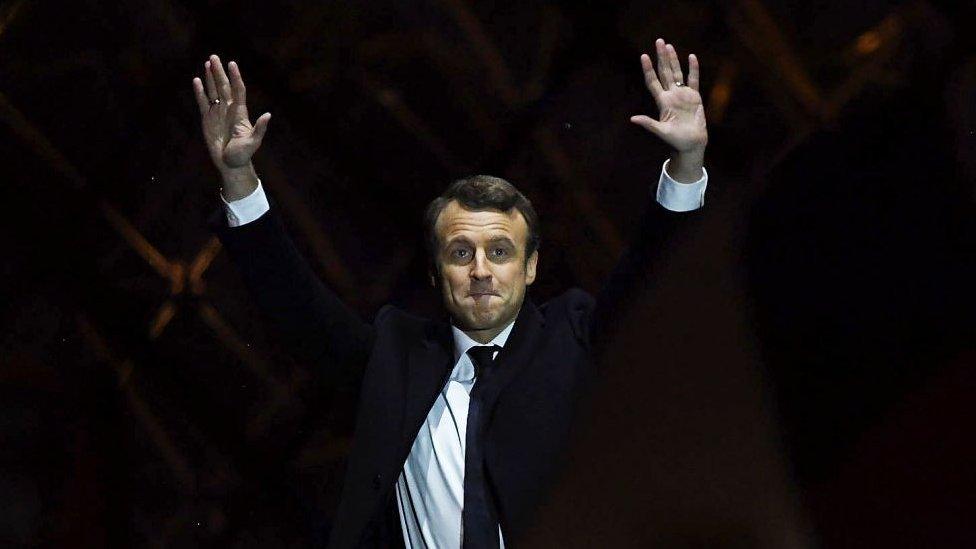Emmanuel Macron: EU press relief at French outcome
- Published
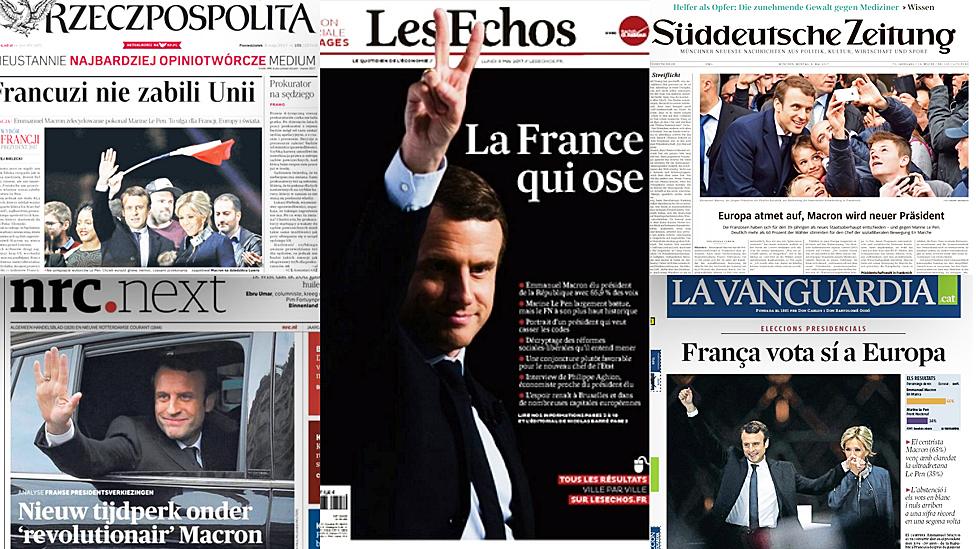
Emmanuel Macron's victory dominated European headlines
Leading newspapers in France and across the European Union have expressed relief at the victory of Emmanuel Macron in the French presidential election.
However, most see him facing major challenges in reaching out to those who voted for his far-right opponent, Marine Le Pen, or simply abstained.
French papers from the centre-right to the traditional left celebrate Mr Macron's win.
Centre-right Le Figaro's front page plays on the name of his En Marche political movement with its headline "Victory on the move", and Les Echos business daily praises a "France that dares".
Left-wing Liberation has dual portraits of the two candidates, captioning Mr Macron "Well played" and Ms Le Pen "serves you right".
But caution about the task of uniting a divided country soon intrudes in the editorials.
Centre-left Le Monde, external has no doubt that "a huge task awaits Emmanuel Macron", which conservative papers like Le Figaro, external sum up as Mr Macron's "positive, dynamic, reformist France, open to Europe" representing "only a quarter of French citizens", with another half from the far right and much of the left "radically hostile to the values that it embodies".
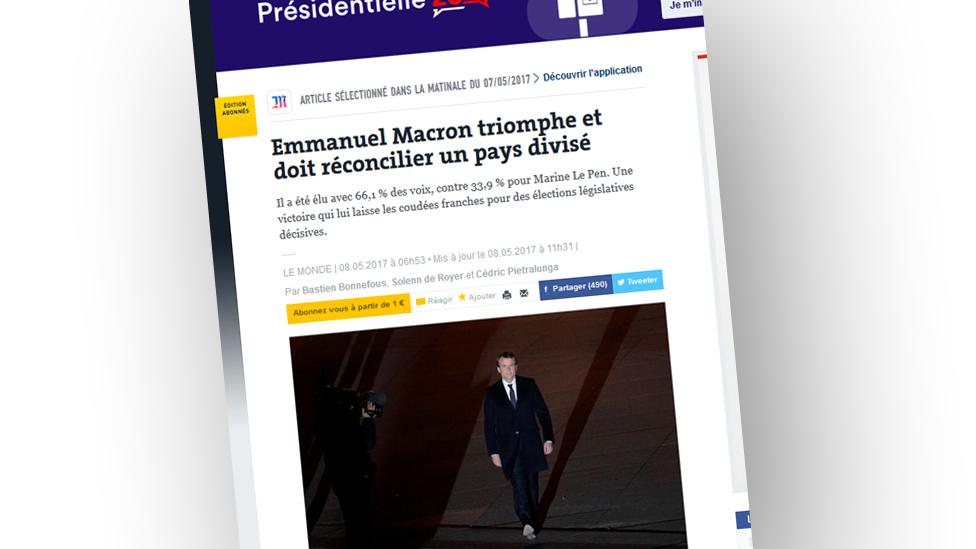
Le Monde calls on Mr Macron to "reconcile a divided country"
The Catholic daily La Croix, external reminds the new president that "his win was very good but also very bad, as many citizens voted for him only in order to stop the threat of the National Front".
From the far left, L'Humanite, external fires a warning shot across Mr Macron's bows.
"A new fight begins," it declares, calling on the left "to use the parliamentary elections to challenge the liberal policies announced by the new head of state".
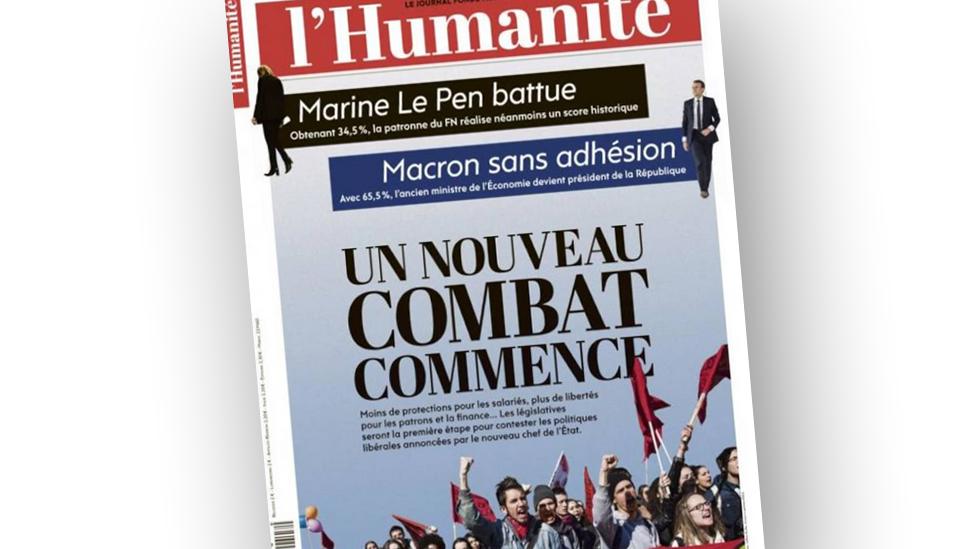
The far-left L'Humanite warns of a "new fight beginning"
Still, many papers are pleased for the moment that, as Les Echos, external says, an "astonished world sees a young, audacious, and conquering France... at a time of triumphant populism".
Liberation, external too sees a "win for the Republic" that told the "xenophobes - even though they remain strong, threatening and active - that France does not want them."
'Europe breathes again'
German newspapers express a sense of relief that Marine Le Pen's anti-EU programme was defeated. "Europe can breathe again", in the words of the top-selling tabloid Bild, external.
But concerns about the next step are not far from the front pages. Holger Steltzner in the centre-right Frankfurter Allgemeine Zeitung, external is worried by a recent poll that shows widespread opposition to globalisation in France.
He warns that the "Franco-German engine" can only revive Europe through "acceptance of the challenges of globalisation… and more of the market economy, rather than greater redistribution of tax revenues through Brussels".
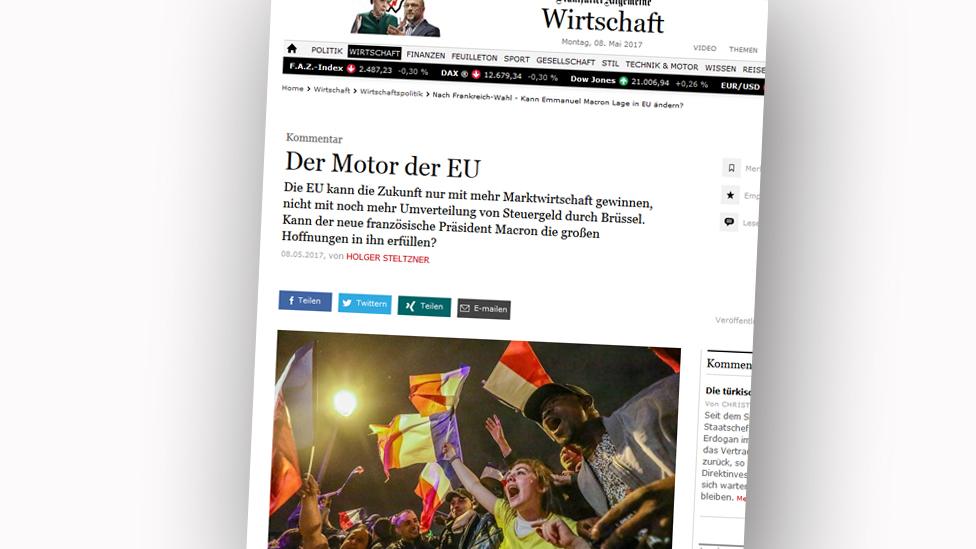
Frankfurter Allgemeine Zeitung assesses the state of the "EU's Engine"
The centre-left Sueddeutsche Zeitung, external's Stefan Kornelius says the result "averts disaster" for France and the EU, but he also sees danger in Emmanuel Macron's call for the public to reject the old party system at next month's parliamentary elections.
He advises Mr Macron not to be a "super-president" who ignores the parties, as these "transmission belts for popular moods and concerns" can help him "re-energise the political centre" and counter the National Front.
And Lilith Volkert, external in the same paper calls on Mr Macron to turn En Marche into a "powerful party" to retain momentum for the parliamentary elections.
'Turning point'
In Italy, La Repubblica, external hopes that the vote marks a "turning point" for Europe away from populism.
Corriere della Sera, external's Aldo Cazzullo expresses wonder at a major country "writing a blank cheque to a young man who went against the pessimistic and populist spirit of the time", but advises Mr Macron to underestimate neither the ability of the old parties to recover nor the anti-globalisation "anger" among those who did not vote for him.
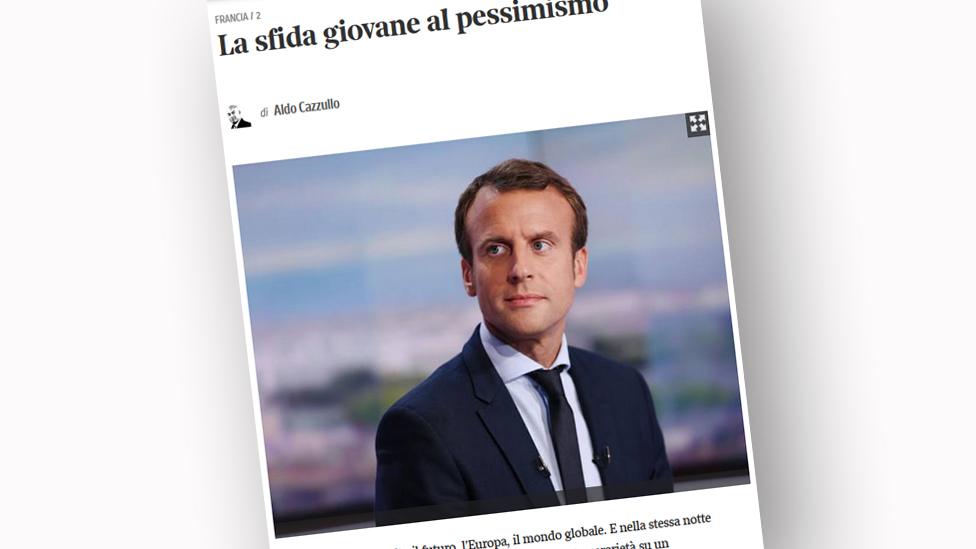
Corriere della Sera praises the "young challenge to pessimism"
Wolfgang Hansson in Sweden's Aftonbladet, external agrees that the old parties will do "all in their power" to block Mr Macron's policies if they make a comeback at the parliamentary elections.
He fears that they could make France "ungovernable", and that failure to address unemployment and inequality means "it's only a matter of time before new and old extremists once again get the chance to take over".
Belgium's Le Soir, external thinks Mr Macron's victory speech, in which he reached out to France's malcontents, "shows that he got the message", but fears that failure to win a parliamentary majority will leave him a "weakened president, hostage to the petty games of other political groups".
Spain's El Pais, external too sees "huge challenges" in attempting a reform programme with no political machine to speak of.
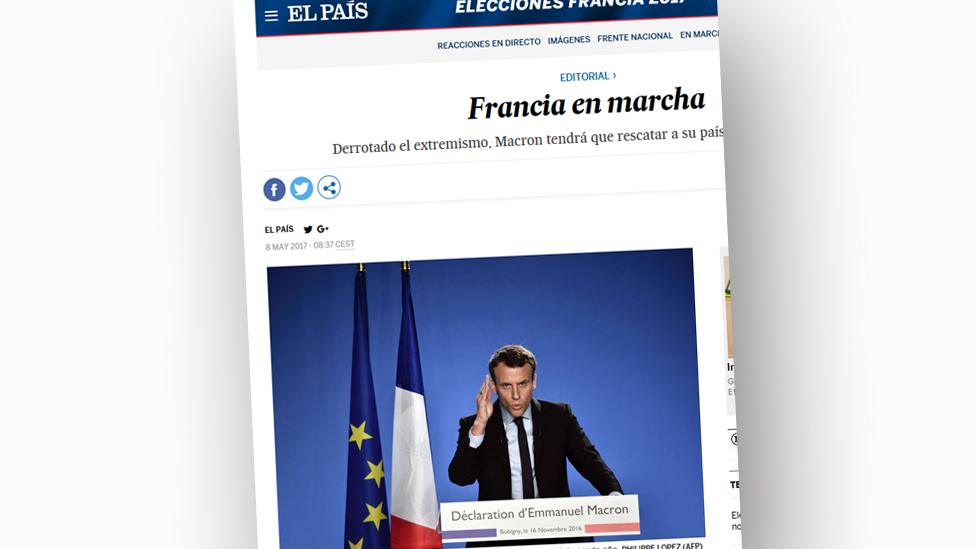
Spain's El Pais sees France "on the move"
By contrast, Peter Vermass in the Dutch newspaper NRC Next, external is relieved that French voters "did not allow themselves to be swayed by external factors like fake news, foreign propaganda or the continuing terrorist threat", and praised the new president's victory speech for avoiding triumphalism.
'Great war'
Polish papers highlight tensions ahead between western members of the EU and the more authoritarian governments of the east.
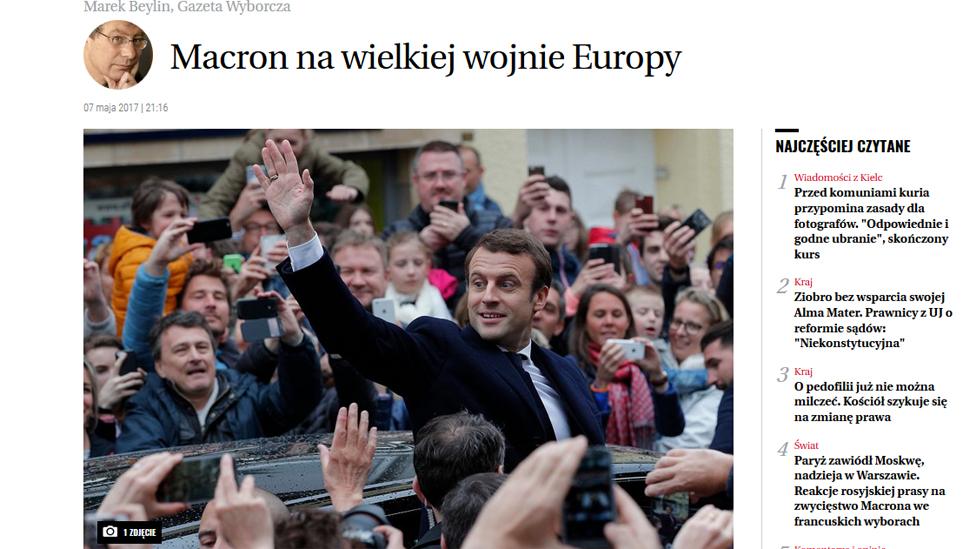
Gazeta Wyborcza sees no end to the "great war over Europe"
Marek Beylin in Poland's liberal Gazeta Wyborcza, external warns that the "great war between European democracies and authoritarian nationalists will rage again tomorrow", once the celebrations are over, although he is confident that Mr Macron's win shows that "Europe is coping with the assault" from the right.
Jerzy Haszczynski in the conservative Rzeczpospolita, external agrees that the "European Union has steered away from a great reef", in particular over restraining Russia's ambitions, but expects Poland's right-wing government to see relations with France suffer.
BBC Monitoring reports and analyses news from TV, radio, web and print media around the world. You can follow BBC Monitoring on Twitter , externaland Facebook, external.
- Published7 May 2017
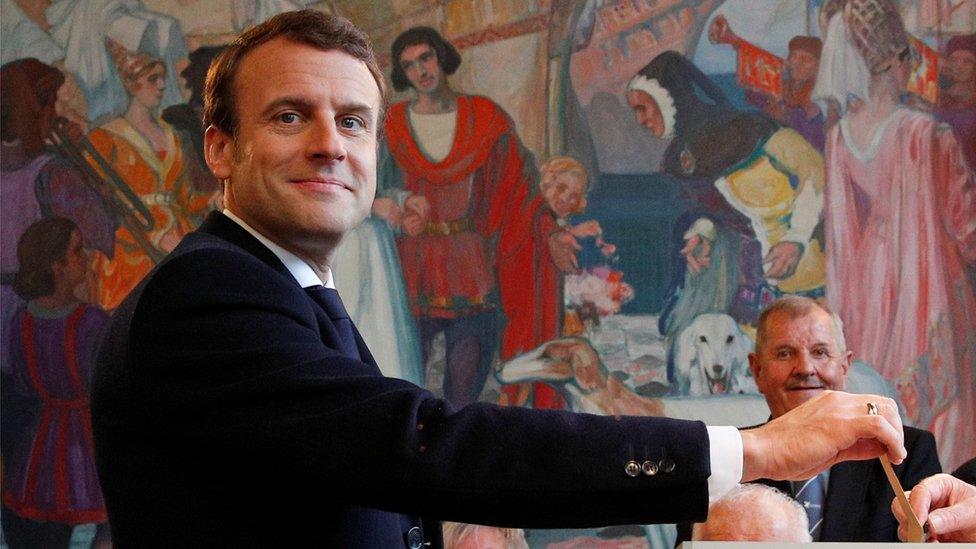
- Published4 May 2017
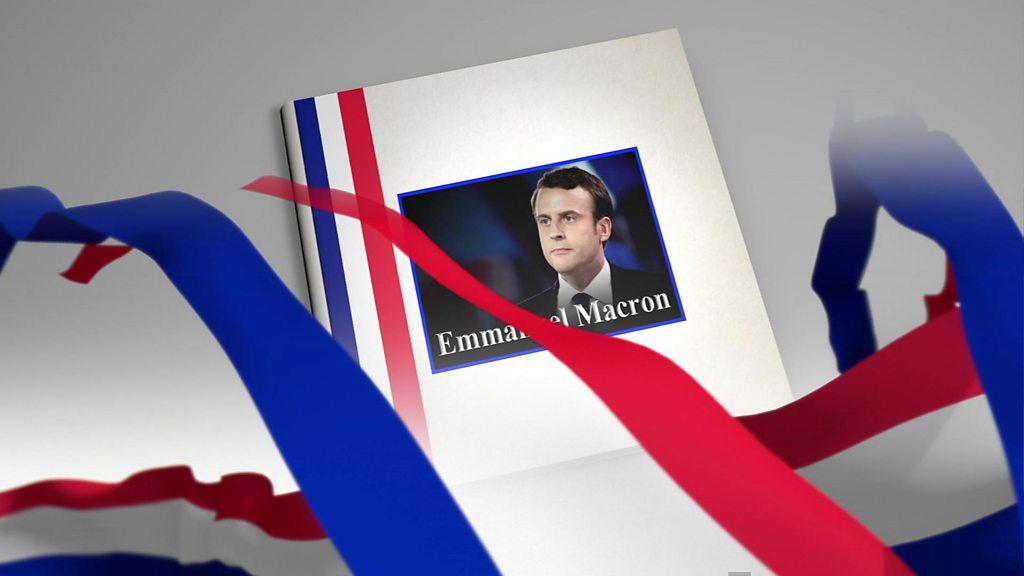
- Published8 May 2017
